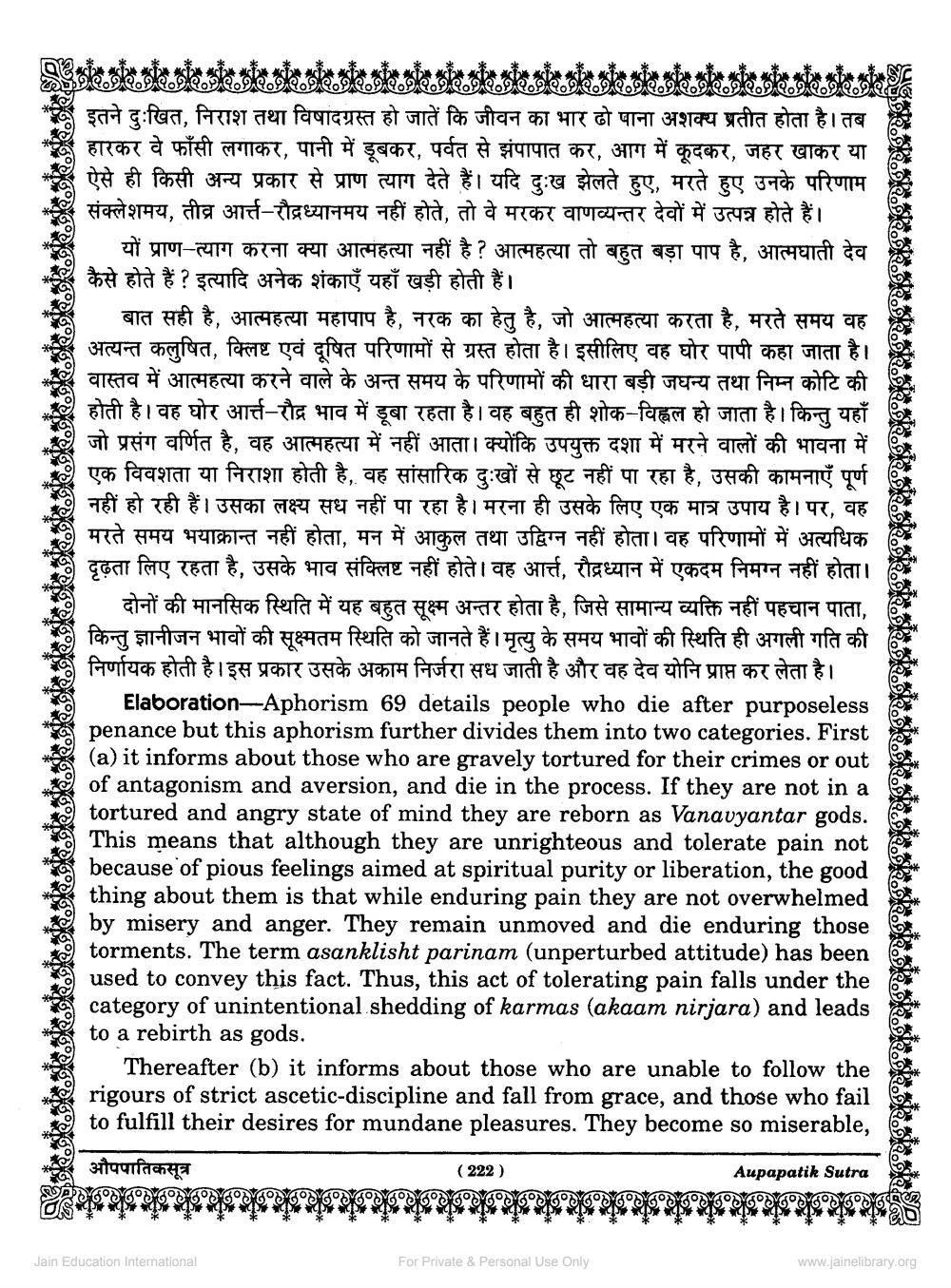________________
*AR
69RO9009009009009009
पEKKRAMRODROD
* इतने दुःखित, निराश तथा विषादग्रस्त हो जातें कि जीवन का भार ढो पाना अशक्य प्रतीत होता है। तब
हारकर वे फाँसी लगाकर, पानी में डूबकर, पर्वत से झंपापात कर, आग में कूदकर, जहर खाकर या
ऐसे ही किसी अन्य प्रकार से प्राण त्याग देते हैं। यदि दुःख झेलते हुए, मरते हुए उनके परिणाम * संक्लेशमय, तीव्र आर्त्त-रौद्रध्यानमय नहीं होते, तो वे मरकर वाणव्यन्तर देवों में उत्पन्न होते हैं।
__यों प्राण-त्याग करना क्या आत्महत्या नहीं है? आत्महत्या तो बहुत बड़ा पाप है, आत्मघाती देव * कैसे होते हैं ? इत्यादि अनेक शंकाएँ यहाँ खड़ी होती हैं। * बात सही है, आत्महत्या महापाप है, नरक का हेतु है, जो आत्महत्या करता है, मरते समय वह * अत्यन्त कलुषित, क्लिष्ट एवं दूषित परिणामों से ग्रस्त होता है। इसीलिए वह घोर पापी कहा जाता है।
वास्तव में आत्महत्या करने वाले के अन्त समय के परिणामों की धारा बड़ी जघन्य तथा निम्न कोटि की 2 होती है। वह घोर आर्त्त-रौद्र भाव में डूबा रहता है। वह बहुत ही शोक-विह्वल हो जाता है। किन्तु यहाँ २ जो प्रसंग वर्णित है, वह आत्महत्या में नहीं आता। क्योंकि उपयुक्त दशा में मरने वालों की भावना में * एक विवशता या निराशा होती है, वह सांसारिक दुःखों से छूट नहीं पा रहा है, उसकी कामनाएँ पूर्ण
नहीं हो रही हैं। उसका लक्ष्य सध नहीं पा रहा है। मरना ही उसके लिए एक मात्र उपाय है। पर, वह मरते समय भयाक्रान्त नहीं होता, मन में आकुल तथा उद्विग्न नहीं होता। वह परिणामों में अत्यधिक दृढ़ता लिए रहता है, उसके भाव संक्लिष्ट नहीं होते। वह आर्त्त, रौद्रध्यान में एकदम निमग्न नहीं होता।
दोनों की मानसिक स्थिति में यह बहुत सूक्ष्म अन्तर होता है, जिसे सामान्य व्यक्ति नहीं पहचान पाता, किन्तु ज्ञानीजन भावों की सूक्ष्मतम स्थिति को जानते हैं। मृत्यु के समय भावों की स्थिति ही अगली गति की निर्णायक होती है। इस प्रकार उसके अकाम निर्जरा सध जाती है और वह देव योनि प्राप्त कर लेता है। ___Elaboration-Aphorism 69 details people who die after purposeless penance but this aphorism further divides them into two categories. First (a) it informs about those who are gravely tortured for their crime of antagonism and aversion, and die in the process. If they are not in a tortured and angry state of mind they are reborn as Vanavyantar gods. This means that although they are unrighteous and tolerate pain not because of pious feelings aimed at spiritual purity or liberation, the good
ing about them is that while enduring pain they are not overwhelmed oy misery and anger. They remain unmoved and die enduring those torments. The term asanklisht parinam (unperturbed attitude) has been used to convey this fact. Thus, this act of tolerating pain falls under the
category of unintentional shedding of karmas (akaam nirjara) and leads * to a rebirth as gods.
Thereafter (b) it informs about those who are unable to follow the rigours of strict ascetic-discipline and fall from grace, and those who fail to fulfill their desires for mundane pleasures. They become so miserable,
*
औपपातिकसूत्र
(222)
Aupapatik Sutra
Jain Education International
For Private & Personal Use Only
www.jainelibrary.org




